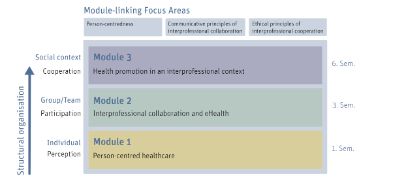Study programmes
Collaborative healthcare requires interprofessional skills. You acquire these in specific modules of our four bachelor’s degree programmes. You can develop your leadership skills in our unique master’s degree programme ‘Science in Healthcare Leadership’.
Interprofessional education in the bachelor’s degree programmes
In three interprofessional modules, students on the full-time Bachelor's degree programmes in Nursing, Midwifery, Nutrition and Dietetics and Physiotherapy acquire interprofessional and cross-professional skills.

In three interprofessional modules, students on the full-time bachelor’s degree programmes in Nursing, Midwifery, Nutrition and Dietetics, and Physiotherapy acquire interprofessional skills, such as communication and role allocation, and cross-sector competencies that are directly related to interprofessionalism, such as person-centredness, health literacy, digitalisation, eHealth, prevention and health promotion. The MIX modules take place in the first, third and sixth semesters and account for a total of 12 ECTS credits of the entire bachelor’s degree programmes (180 ECTS credits).
Interprofessionelle Module der Bachelor-Studiengänge an der BFH Gesundheit
Module 1: Person-centred care
Module 1 focusses on the individual within their specific living environment and social relationships. Key topics include communication in the therapeutic context; understanding health and illness; the Swiss healthcare system and its stakeholders; ethical and legal principles; and dealing with the situation of the individuals in the interprofessional care team. In cooperation with the University of Bern’s Institute for Medical Education and the Institute of Primary Health Care (BIHAM), a seminar on confidentiality is held in Bern and Basel for students from Bern University of Applied Sciences and medical students.
Module 2: Interprofessional collaboration and eHealth
Digitalisation in society and healthcare has a direct impact on interprofessional collaboration and patient treatment options. New technologies are changing information and communication channels, in some cases enabling new forms of cooperation. In order to navigate the increasingly complex healthcare system, health literacy is essential, both on the part of the individual affected and the treatment team. In addition to these cross-professional issues, Module 2 focusses on specific aspects of interprofessionalism, decision-making processes and communication in interprofessional teams.
Module 3: Health promotion in an interprofessional context
Health is shaped by complex processes and a variety of contributing factors – physical, psychological, socio-systemic, cultural and material. Effective health promotion and preventive healthcare are only attainable if a wide range of perspectives are taken into account. In Module 3, the foundations of project management are deepened in a real, interprofessional prevention and health promotion project. In mixed profession groups, you spend a few weeks developing information brochures, workshops, concrete recommendations and needs-oriented products for the various project partners.
Interprofessional education in the MSc degree programmes
Our interprofessional master’s degree programmes are designed to train future graduates to become influential players in the healthcare sector. You complete selected interprofessional modules, such as applied ethics, advanced practice or the foundations of health economics, with the other master’s students of the School of Health Professions. Confronted with different perspectives, you learn to question your own assumptions and understand others. This enables you to develop competencies in interprofessional collaboration and a holistic approach to practical situations. As a graduate, your expertise extends beyond your specific professional specialisations. You work agilely and on an equal footing with other healthcare professionals and with patients, clients and their relatives.
As healthcare professionals who have undergone professional and interprofessional training at university level, you will contribute to the further development of your profession and of healthcare in general.
Applied ethics
Providing professional care for individuals with health concerns invariably gives rise to ethical issues. In this module, you learn to discuss these issues on a theoretical level, to illustrate them in practical terms, and to address them in your specific professional practice. Additionally, you deepen your knowledge of the ethical principles of interprofessional collaboration and of clinical ethics, which are of crucial importance for the work of healthcare professionals at master’s level.
Interprofessional communication
This module offers an in-depth exploration of several types of communication. On the one hand, it focusses on communication with clients and patients (therapeutic relationship). In addition, you learn the advanced technique of motivational interviewing in an interprofessional context or in critical situations with clients or patients. On the other hand, you professionalise your scientific writing skills with a view on your target audience, gain an overview of the communication practices of research institutes, and improve your presentation skills in public and health policy settings.
Leadership, project and change management
This module provides an overview of the foundations of leadership, project management and various leadership models. You discover organisational development approaches for initiating, implementing and subsequently evaluating change management processes.
Advanced Practice
This module teaches advanced practice and the different roles involved. In the course, you focus on the development and implementation of new roles for healthcare professionals in future or existing care models. The interprofessional context helps achieve a comprehensive understanding of these new models and roles. You also acquire knowledge about the legal foundations and issues relating to health policy and health economics in connection with advanced practice roles, and look at how such new care models can be implemented in practice.
Foundations in health economics
In this module, you develop an in-depth understanding of the healthcare system and the decision-making behaviour of key players on the demand side (insured persons, patients) and the supply side (healthcare professionals, doctors) of the healthcare market. Drawing from theoretical and current empirical research findings in the field of health economics, a wide range of practice-relevant questions are analysed. The causes of rising healthcare costs are discussed, as is the impact of financial incentives on the therapeutic decision-making of healthcare professionals, and the effect of deductibles on patients’ use of medical services.
Nutrition in patients with chronic pain
Food as medicine. The module explores the impact of food on human behaviour in the context of psychoneuroimmunology. Current scientific findings on the link between intestinal flora, pain and depression are discussed, as well as the role of prebiotics, probiotics and phytotherapy in pain management.
Digitalisation and digital transformation in healthcare
Digital transformation in healthcare offers numerous opportunities for health promotion, preventive healthcare, diagnostics, therapy, care and treatment – for people of all ages and for all care settings. A targeted, reflective, critical and active approach to digital transformation has the potential to maintain and enhance the quality and efficiency of the Swiss healthcare system.
Master of Science in Healthcare Leadership
The new Master of Science in Healthcare Leadership is unique in Switzerland. As a healthcare professional, you will develop comprehensive leadership skills and specific management expertise.
The master’s degree programme has been developed in collaboration with the Nursing directorate of Insel Group and is designed for healthcare professionals. Based on five module groups, the programme aims to broaden your skills and abilities in healthcare, the foundations of health economics, applied statistics and research methods. The focus of the studies is on leadership and management. You complete your studies with a master’s thesis.
